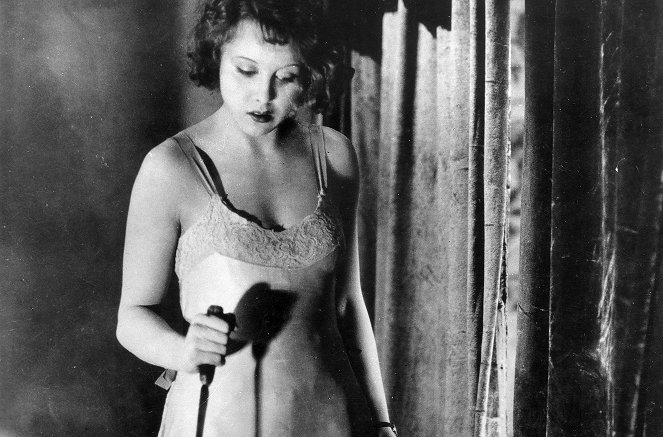Directed by:
Alfred HitchcockCinematography:
Jack E. CoxComposer:
Hubert BathCast:
Anny Ondráková, Sara Allgood, Charles Paton, John Longden, Donald Calthrop, Cyril Ritchard, Alfred Hitchcock, Joan Barry, Phyllis Konstam, Percy ParsonsPlots(1)
While having dinner in a fancy English nightspot with her husband-to-be Scotland Yard Detective Frank Webber, Alice White begins to flirt with an artist seated at the next table. Later, he invites her up to see his studio, and she goes. She is surprised when he asks her to pose nude for him and politely declines. But when the request becomes a demand, Alice stabs him to death. She then rejoins her fiance and tries to forget the murder, but her conscious keeps bothering her. Her troubles are not over however, as she soon finds herself being blackmailed by the opportunistic Tracey. (official distributor synopsis)
(more)Reviews (6)
Thanks to the Finále Plzeň festival I saw the version without sound and I have to say that it is perhaps one of the most thrilling silent films ever. Only Anny Ondráková was awkward at times (immediately after the murder she behaved in such a way that she was really terrified, but I'm not sure if that was the intention). However, Alfred Hitchcock obviously did his best, used a lot of imaginative directorial tricks, made the ending very action-packed and as a screenwriter he didn't forget about black humor - when a customer in a shop condemns knife murders, whereas she doesn't mind beatings with a brick.
()
The last of four films made by Anny Ondra independently in England. She didn't start there with Hitchcock, but rather with Graham Cutts. Unfortunately, many academic clichés are often piled on top of the phenomenon that is this entire film, and this turns Blackmail into a rather tragically scholastic affair in certain situations. That’s unfortunate because at least the scene with Cyril Ritchard's attempted rape of Anne-Alice is very powerful (I hated him in Piccadilly too). And if Dorothea Friedrich claims that Anny badly needed a sound film for better plots, she was certainly not very sober. The comparison between the silent and the sound version turns out to be more positive for the silent version.
()
A timeless crime drama about coping with the torment of guilt that brilliantly launched Hitchcock’s stellar career, hinting for the first time at the visually perfectionist and emotionally powerful direction most of his later films would take. It's not completely flawless yet, and the master is still learning how to conjure a satisfyingly rich atmosphere, but the idea is very strong and the final scene pulls down a great satirical curtain behind the film... 80%
()
Maybe the finale was a bit unnecessarily hastily cut short and too unspoken. If such a thing can be said, um, or written, about a silent movie. It’s just a movie that clearly shows what will be Alfred’s strengths in the future. I was most satisfyingly satisfied. Especially with Hitch’s performance and despite the ever-present annoying horn in the background which was meant to simulate sound of traffic. Silent version: ?/5, Sound version: 4/5
()
Alfred Hitchcock's first sound film is, within the possibilities of its time, a fairly well-made crime-thriller, in which the cinematography and editing between scenes are particularly outstanding. Anna Ondráková's performance is convincing (again, within the confines of her time), and I enjoyed the director's small cameo. I'm just not too happy with the film's ending, as it was too quick considering how easily and smoothly everything had gone before. All in all, an above-average film that, while it looks ridiculous at times today, must have been a blast back then (if only for the sound).
()


Ads